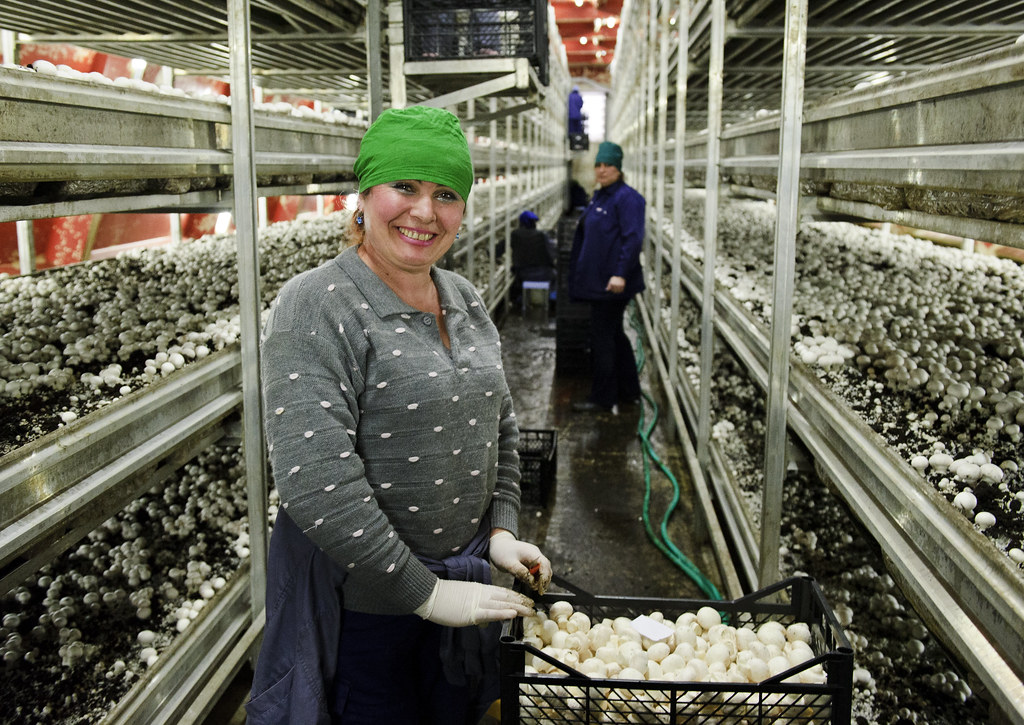Backyard mushroom businesses are popping up in sheds and shipping containers across Australia, but the fascination with fungi has presented a new challenge – proving they are safe to eat.
While growers who supply major retailers must comply with food safety certification standards, there have been no specific programs for smaller producers who sell to markets, restaurants and cafes.
Australian mushrooms have never been subject to a contamination outbreak, but there are concerns that if they were, all growers would suffer as consumers lost faith in the produce.
Now the Australian Mushroom Growers Association (AMGA) has led the development of its own voluntary scheme to give both consumers and growers confidence.
Popping up like mushrooms
AMGA general manager Leah Bramich said several times a week people reached out to her to discuss starting a mushroom business.
“Mushrooms are really trendy at the moment, ” she said.
“They’re really exciting, they grow very fast, and Aussies are really starting to embrace mushrooms of all different varieties.
“But it also poses a food safety risk.”
Ms Bramich said part of the attraction was how easy it was to get started, with little infrastructure or land needed.
“Mushrooms are grown on pretty much like bunk beds that can be grown in a cool room,” she said.
“We’re seeing more and more mushroom farms that are popping up in urban areas, or growers have other commodities that are branching out using their cold rooms.
“The ‘SAFE Mushroom’ program is really there to help the starter mushroom growers or the smaller operators where certification isn’t a requirement of their business.”
Food safety researcher Dr Jenny Ekman, who helped develop the program, said the industry had an excellent safety record, but even an isolated outbreak had the potential to be devastating.
“To the consumer, mushrooms are mushrooms — they don’t differentiate one farm from another,” she said.
“If a food safety outbreak were to occur, it would affect the whole industry, not just the individual grower.
Getting the dirt on safety
She said mushrooms were one of the safest foods available, but consumers often misunderstood how they were farmed.
“People have an idea in their heads that mushrooms are grown in compost, and maybe they’re a little dirty, so they have an idea that they can be not safe to eat,” she said.
“We wanted small farms who aren’t doing an expensive certification program to be able to demonstrate to their customers that they are following safe practices and that their product is absolutely safe to consume.”
She said the program was based on Freshcare, the current horticulture industry standard, but was tailored to reflect the unique process of growing mushrooms.
“We basically took out all the requirements that were not relevant to mushroom growers,” she said.
“For example, consideration of whether there has been livestock in the growing area – there are not many pigs or cows coming into mushroom growing rooms.
“(When) you really drill down to the most important things, then we could come up with a very simplified standard that growers could use.”
Simplified confidence
The process is now underway to identify growers to test the new practices ahead of a wider rollout.
Kim Hunt, who started growing mushrooms with her husband Dave when drought hit their lime orchard near Maryborough, 250km north of Brisbane, said it was an exciting step forward.
“We were Freshcare certified for years, and it’s a great system, but it’s a one-size-fits-all system,” she said.
“As a small farm, there’s a lot of recording, paperwork and documentation … you have to pay for the audit every year, and it’s not a cheap process.
“The fact that the Australian Mushroom Growers Association is coming up with a more simplified version for small farms is really exciting for me.”
Ms Hunt said she recently stopped using Freshcare, but she welcomed a new way to give consumers confidence in the food she grows.
“Many of our customers have actually come out and looked at our farms. We have an open invite if you want to come and have a look at what we do. Please do,” she said.
“I think that transparency is important … I know we’re doing the right thing, but it’s good to be able to show that to customers.
“That means that we’re safe, and that’s what it’s about.”
Source : ABC

